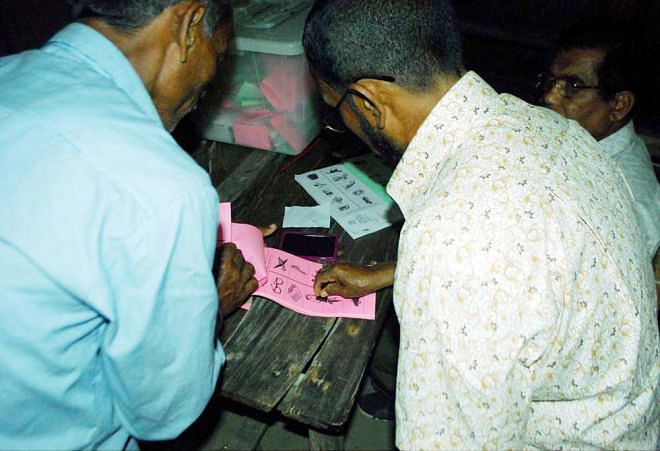Not taking the long view

ELECTION watchers, political analysts and others who want to see democratic institutions and with them democracy flourish in this country have expressed their disappointments over the conduct of the last phases of the recently held upazila parishad elections. At the same time, they emphasised the pointlessness of the electoral victories claimed by the pro-ruling party candidates using illegal methods like capturing polling booths and stuffing ballot boxes amid widespread violence that led to a number of deaths. The point that many of these critics have tried to drive home is that these gross irregularities in the elections with attendant violence have sullied the image of the Election Commission (EC) and, especially, the ruling party, and made fairness and credibility of future elections under the incumbent government questionable. Some, who are bonafide well-wishers of AL, have also pointed out how these rigged upazila elections will lend credence to AL's arch rival BNP's long-standing allegation that elections under AL were not fair.
The concerns expressed are undoubtedly genuine and the arguments placed in their support are unassailable. But is there ever any indication that the AL and its leaders are at all perturbed by the concern expressed and pleas made by various well-meaning quarters? We are not aware of any so far. But what we see on the contrary is that the ruling party leaders are often annoyed at such 'uncalled-for' critiques or words of advice which they rather consider as meddlesome, even inimical. Instances abound.
Consider the post-fourth round upazila polls remarks made by Communications Minister Obaidul Quader. Trashing all allegations to the contrary, he declared: “Upazila elections once again proved that people are the source of power and they have elected their favourite candidates.”
So, those glaring cases of faking and stealing of votes were a demonstration of people's power and the candidates who thus usurped the public offices at the upazila parishads were the 'favourites' of the constituents! Note that this is not coming from any of those government leaders or ministers, whose words people hardly ever take at face value, but from someone who is otherwise well known for being plain-spoken! If his version of the elections is to be accepted as true, then we will have to discard all that was reported in printed and electronic media as false!
We may also note at this point the view Prime Minister Shekh Hasina herself expressed earlier about the upazila elections at an Independence Day discussion (on March 27). Placing the blame squarely on a section of the media for what she termed its “propaganda in a planned way” about the allegations of rigging in the UZ polls, she argued: “I can say, had AL resorted to vote rigging, then no one of the Jamaat candidates would have been able to win.”
We are flabbergasted. However, Jamaat must have been happy about the reference as well as the comparison. But the fact remains that a single incident in support of a case is far weightier than tons of unsubstantiated arguments marshaled against it.
And the suggestion that the success in fielding a single candidate from each constituency by effectively eliminating the rebel problem paid dividends for pro-AL candidates should be equally applicable to the case of their rival pro-BNP candidates, as the latter also suffered from a similar problem and took measures to tackle their own rebels. But then why were the results no t the same?
In fact, the way the pro-ruling party candidates ensured their victory in the upazila elections has taken them nowhere. Even if their rival pro-BNP candidates continued to maintain the lead they enjoyed in the first two phases that would hardly cause any damage to the ruling party in real terms. If anything, the BNP might regain some of its lost confidence. But would that amount to a big loss for AL? Not in the least. On the other hand, it might prove to be a loss for BNP, since they would then be left with little argument to convince the people and the international community that their decision to boycott the January 5 general election was right. And that would have been a big moral victory for AL.
But the ruling party is too impatient to take the long view. And so, to keep its façade of invincibility and ensure that its rival BNP was defeated, the AL has made the very electoral system itself redundant. In an ideal situation where democracy works, the responsibility for the failure of the electoral system would be laid at the Election Commission's (EC) door. But our case is different. Here the EC has lost all its independence and has rather become a government stooge. So, by default, it is the ruling party, or the government for that matter, that has to accept the liability for the failure.
The electoral system and its institutions cannot be allowed to be tampered with and laid to waste in this manner. If the political parties fail to protect these basic institutions through which people can voice their choice, the days are not far off when they will be hoisted by their own petard.
The writer is Editor, Science & Life, The Daily Star.
E-mail:[email protected]

 For all latest news, follow The Daily Star's Google News channel.
For all latest news, follow The Daily Star's Google News channel. 




Comments